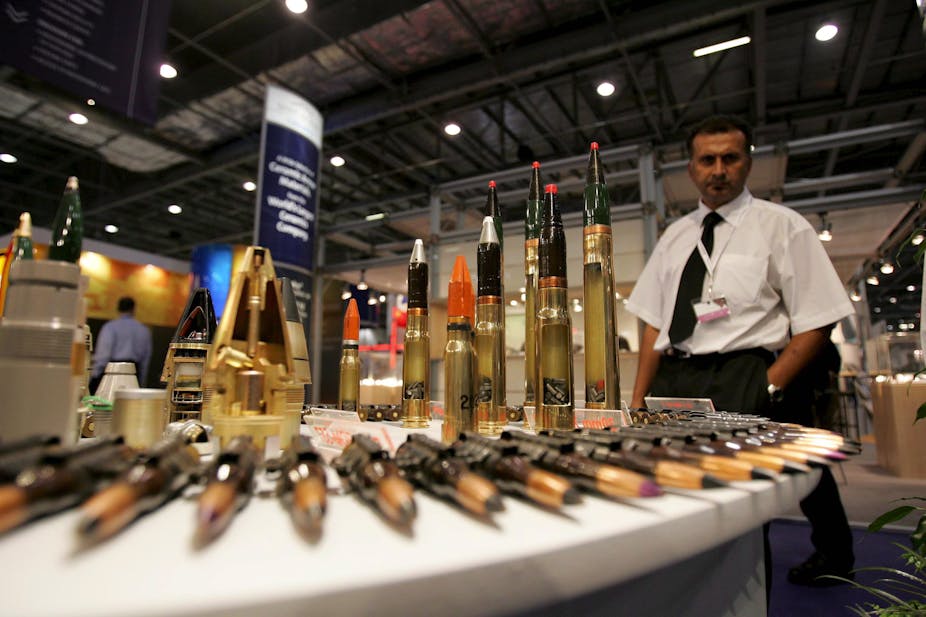Ever since the first New Labour administration of 1997, successive British governments have declared their commitment to so-called “ethical” arms sales. But recent decisions about which countries should or shouldn’t receive arms illustrate the inconsistencies at the heart of government policy on this issue.
Ethical guidelines state that the UK government will not trade arms if there is a clear risk that they might be used for internal repression. Nor should they cause a serious violation of international human rights law or acts of aggression. Arms should also not be traded if doing so would “provoke or prolong armed conflicts or aggravate existing tensions or conflicts in the country of final destination.”
However, as of May this year, the government had issued more than £11.9 billion worth of arms export licences to the 28 countries identified by the Foreign Office as being of human rights concern, including Sri Lanka, Israel and Saudi Arabia.
Double standards
The government has restricted arms exports to Russia in the wake of tensions with Ukraine and successfully campaigned for an EU-wide ban on new deals with the country.
This is consistent with government guidelines, but other decisions are far more questionable. For example, the current value of extant defence export licences to Israel amounts to £7.8 billion, despite the recent offensive against Gaza. This conflict is estimated to have killed more than 2,200 people and injured thousands more.
Most of this is for “dual-use” material, such as cryptographic equipment purportedly bought for civilian purposes. But they also include licences for body armour, all-wheel drive vehicles with ballistic protection, components for sniper rifles, small arms ammunition, water cannon and weapons sights. Indeed, since 2010 the government has licensed US$42m of military equipment including targeting systems and drone components.
Against a background of calls for the UK to stop dealing arms with Israel, the government recently announced a review of export licences to the country. But to date, none have actually been suspended. In the case of exports to Israel it is difficult not to conclude that successive governments have driven a coach and horses through the UK‘s own export criteria, along with components for combat aircraft and battle tanks, among other things.
Now the UK has joined other governments in supplying arms to the Kurds fighting Islamic State in Iraq. This has included the transport of ammunition from Eastern Europe as well as ten tonnes of body armour and other equipment, with more lethal equipment promised.
Clearly there are both geo-political and humanitarian rationales for supplying the Kurds with defence equipment but it is still difficult to reconcile with the government’s commitment not to supply arms that would provoke or prolong armed conflicts.
Changing tides
There are a number of implications arising from these various policy decisions. First, both the UK’s export criteria and most other initiatives aimed at regulating the conventional arms trade have emerged in a post-Cold War era in which – until recently – Western governments felt optimistic about their ability to impose their values on others. That might be through military intervention, diplomatic leverage or multilateral export regimes.
But current supplies to the Kurds may turn out to be symptomatic of a new era. Western nations could now be more pessimistic about their diplomatic leverage, the risks associated with substantial boots-on-the-ground military intervention and rising threats to the Western liberal order. For governments weary of the costs in blood and treasure of full-scale military intervention, the option of supplying proxy forces on the ground seems an attractive option.
At the same time, Britain’s loud declaration of support for international agreements to regulate defence exports has gone hand-in-hand with the adoption of domestic and European initiatives to streamline export approval processes. This is in order to maximise sales and market share. Unsurprisingly, the UK is not the only state adopting such measures.
One response to these trends might be the emergence of calls for the government to abandon its ethical criteria altogether. They also raise concerns regarding implementation of the 2013 UN Arms Trade Treaty. This aims to restrict exports likely to undermine peace and security but leaves the interpretation of such commitments to national governments.
Unless campaigners continue to hold states to account, the UN treaty may simply end up masquerading as an ethical agreement rather than being observed in any meaningful sense. It could be an agreement out of its time even before it has come into force.

